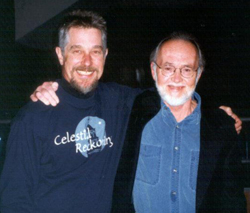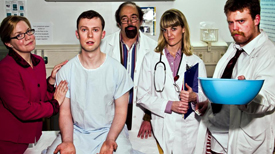He Tried to Make Every Class Like a Small Family
by Aimee Caruso, Valley News Staff Writer
New London – Some people never figure out what they want to do with their lives, but for others, like Don Coonley, the answer comes early on.
Coonley was a junior at Stetson University in 1963 when an English professor he admired took him on as a crew member for a summer sailing adventure in the Bahamas. Two men who had recently earned doctorates, one in American studies, the other in philosophy, rounded out the learned crew.
Meandering from island to island, the novice sailor learned to negotiate 12-foot high swells, to navigate narrow, rocky channels. He also caught a glimpse of his future as a college professor.
Decades later, Coonley, by then a professor in Colby-Sawyer's Communication Studies program, laid out the lessons he'd absorbed that pivotal summer from the "men who moved easily between theory and practice."
"I learned first that the world of ideas and the world of action could coexist," he wrote in an article for a Stetson University magazine. "The two, which I imagined were separate and distinct, could coalesce into a richer fabric of experience.
"And ... I learned that this kind of experience that I so admired and was just beginning to understand might be attained by becoming a college teacher myself."
Nancy Serrell Coonley, his wife of 27 years, remembers him describing the late night talks about philosophy and history he'd shared with those "tough, salty guys."
"He never had heard people do this outside of a classroom, so finding that learning so enriched their lives ... was just life altering," she said. "He not only wanted to live his life that way, but he wanted to provide those experiences for his students."
During his tenure as a professor at Sacred Heart University in Fairfield, Conn., and later at Colby-Sawyer College, he did just that, creating courses that wove literature with kayaking, photography with writing, and filmmaking classes that sparked collaborations between students and community members.
In the fall of 2001, when Coonley's video production class decided to create projects in response to the 9/11 attacks, Krista Tracey was among the students he took to New York City. There, she interviewed people who worked near the towers and shot photographs and video footage at ground zero.
"That was one of those times when I realized what I was capable of accomplishing," said Tracey, a 2004 Colby-Sawyer graduate.
Coonley knew when to steer and when to gently guide. He oversaw the work, she said, but also encouraged them to make it their own.
"He never made you feel like he was the teacher and you were the student," Tracey said. "You always felt like you were working with him instead of for him."
And he had a knack for getting students to do their best.
Never mean or harsh, Coonley was nonetheless "a perfectionist," said Lauren Kovach, who "took every class he taught" at Colby- Sawyer. "If you were someone he thought could do it, he expected you to do it, and earn that A."
Not an easy task, said his wife, who knows firsthand – she first met Coonley after returning to school to get her bachelor's degree at Sacred Heart University.
"He pushed students," she said. "They didn't always love it at the time, but they did like the results."
Demanding as he could be, Coonley was also a reassuring presence, said Kovach, who was Tracey's classmate. His warm demeanor put people at ease, both in and out of the classroom.
"He would let you talk and just kind of listen," she said.
Early on, when Kovach was feeling "a little lost" at college, Coonley invited her to join his work-study team. The job, which involved teaching other students to use video equipment, developed her self-confidence, which was no accident.
"He was just very good at reading people," she said. "He saw something in me that I didn't even see in myself."
And he created a comfortable atmosphere at the college, where he started the community radio station and developed a video production program with an emphasis on public service.
"At the end of every semester, he would have all of the communication students over to the house," Tracey said. "He tried to make every class like a small family."
It's a description that rings true to Whitney Serrell Barbera, Nancy Serrell Coonley's daughter.
"Don didn't have biological children, but he had thousands of children who were not biological," she said, referring to his students, who often kept in touch long after they had graduated. And the equation worked both ways.
Barbera said Coonley probably never thought of her and her brother, David Serrell, as his students, but in a way they were.
"He taught me to drive. He taught me how to pitch a tent," always taking a "very hands-on approach, said Barbera, who was 15 when he and her mother married. "He was more throwing the student right into the arena, so to speak."And the lessons went deep.
"He taught me to be the best person that I could be for myself and for my family," Barbera said, her voice thick with tears. "He had such high standards for himself that you just had to take some of those standards for yourself."
He wasn't always toiling away – Coonley also loved to play tennis, hike, run, and work with his hands – but, his creative endeavors were "threaded into life," Nancy Serrell Coonley said.
"I remember he said to me, 'I think an ideal life is one in which you can't draw a hard line between work and the rest of life,'" she said. "And for him, that was absolutely true."
At the beach, Don would go over scripts from his friends, and they would give him feedback on his, she said. And during a vacation in St. John, he and longtime friend and collaborator Steve Ross once shut themselves in a room to rerecord a section of a film they were working on about American painter Winslow Homer.
But Coonley, whose parents were both educators, didn't spend much time talking about the philosophy of education, his wife said. Instead, he dove into projects, taking his students, and the community, right along with him.
"It was a very challenging thing to do," she said. "You need to be able to let go. ... You need to be able to trust your students, and his students rose to his trust."
She recalled working as an extra and designing props for the film “Purdy's Station,” an award-winning drama about a schoolteacher working on the Underground Railroad that Coonley wrote, produced and directed. Parts of the film were shot in their 19th century home in Newtown, Conn.
"The phone would be ringing and people would be delivering things," she said. "Then suddenly it was time to shoot and everything had to go silent, and you would pray that an airplane wouldn't go over."
Ross worked as a professor at Sacred Heart University alongside Coonley, who founded the school's media studies program. The older man had shown him what it meant to be a teacher, said Ross, who now teaches in the Department of Communication at the University of Memphis.
They worked together on “Windcrossing,” a play Coonley wrote and directed about an aviation pioneer. Ross was producer and cinematographer for the project, which involved students, who Coonley treated as co-creators.
"They had enormous responsibilities and enormous pressures," Ross said, and they took pride in the production as if it were their own. "I think one reason why he affected so many students is he was one of those teachers that conveyed a sense of excitement about ...the process of learning."
Coonley received many awards for his teaching and for his films. But he once told his wife that of all the movies he had made, the ones he created for David and Whitney were probably the most significant.
When they were young, Coonley made short movies for their birthdays, snapshots of their lives that included still photos, and footage from sporting events or "whatever they were into at that moment," Nancy Serrell Coonley said. "It was a beautiful record of their growing up."
On their birthdays, the family would gather to watch the earlier films, and Coonley would unveil that year's production."It kind of became this ritual," said David Serrell, now 40. "It was very exciting, especially if you were the star."
Barbera laughed, remembering her 16th birthday film and its theme song, Cyndi Lauper singing “Girls Just Wanna Have Fun.”
"There is so much time and effort involved with collecting a year of a person's moments," she said, with admiration. "You really had to appreciate everything that went into that."
And then she added a phrase that seemed appropriate for all of Coonley's work. "It was certainly a labor of love."

Windcrossing Film Festival to Honor Don Coonley Blows New Life into Video Production at Colby-Sawyer
When Donald Coonley died after a long illness on June 8, 2011, at age 68, he left behind a legacy of an inspired existence devoted to family, film and education, and Colby-Sawyer College lost one of its greatest models and mentors in creative communications.
A professor in the Communication Studies Program at Colby-Sawyer from 1989 to 2008, Coonley was a writer, filmmaker and college professor who influenced his students with warm, inspiring teaching and friendship. His presence is still felt among his colleagues at Colby-Sawyer and the students who graduated during his tenure.
At his memorial service, Mike Mooney '00 and Will Peters '04, co-founders of Vermont-based Hammer & Saw Films, began a quiet discussion about how best to honor the man who shaped their four years at Colby-Sawyer. They seized on the memory of the annual festival their professor had mounted every year, The Festival of Lights, which had faded away with his retirement, and decided they should create something that would involve students, alumni, faculty and staff. After sharing their idea with Donna Berghorn, Ph.D., associate professor of Humanities, Windcrossing: A Festival of Sight and Sound, emerged as a fitting tribute to the man they admired and a revival of the art form he nurtured and cherished on campus.

The first Windcrossing festival dedicated to the memory and legacy of Donald Coonley will take place April 28 at 7 p.m. in the Sawyer Fine and Performing Arts Center. Admission is free.
While this festival is grounded in the history of Coonley's work, say Mooney and Peters, it is also geared toward the future progress and growth of film and video production at Colby-Sawyer College.
Windcrossing will feature the premieres of two independent films adapted from students' ten-minute plays and a Hammer & Saw short film, as well as Capstone videos produced by Media Studies (formerly Communication Studies) seniors. The casts and crews of the films feature college staff members, current and retired faculty, students and alumni, plus friends and supporters of the arts at the college.
“The Checkup” is written and directed by Peters and stars Mike Clark, Jay Lambert and alumni Kate Lovell, Suzanna Brown and Zach Matson. The comedy is about a man named Walter and his startling discovery that his doctors aren't exactly what they're cracked up to be. The medical-themed short film started rehearsing in early February and was filmed in the Colgate Nursing Lab.

“It's Not Not Safe,” written and directed by Mooney, stars alumni Charles Moak and Aaron Hodge with retired theater director and professor Jerry Bliss in a crime/comedy that suggests “when time is not on your side … get a new watch.”
Peters directs “Exit 7A,” written by Adjunct Assistant Professor of Fine and Performing Arts Asher Ellis '06, and stars alumni Ben Watts and Mike Mooney, Angela Borrello, Joshua Heggie, Linda Lambert, Jay Lambert and Jerry Bliss. When a hitchhiker answers the question “Where are you going?” by responding that she plans to kill someone who lives off Exit 7A, the next question becomes, “Do you think you can stop me?”
Hammer & Saw's 2010 release, “Motel,” written and directed by Peters and featuring Mooney, Watts and Ellis, was shown in the 2010 Vermont International Film Festival, the 2011 New England Film Festival, and the Somewhat North of Boston Film Festival, where it won Best Short Comedy and Best of the Best awards.
Keep up to date with Windcrossing's progress on Facebook.
-Kate Seamans





